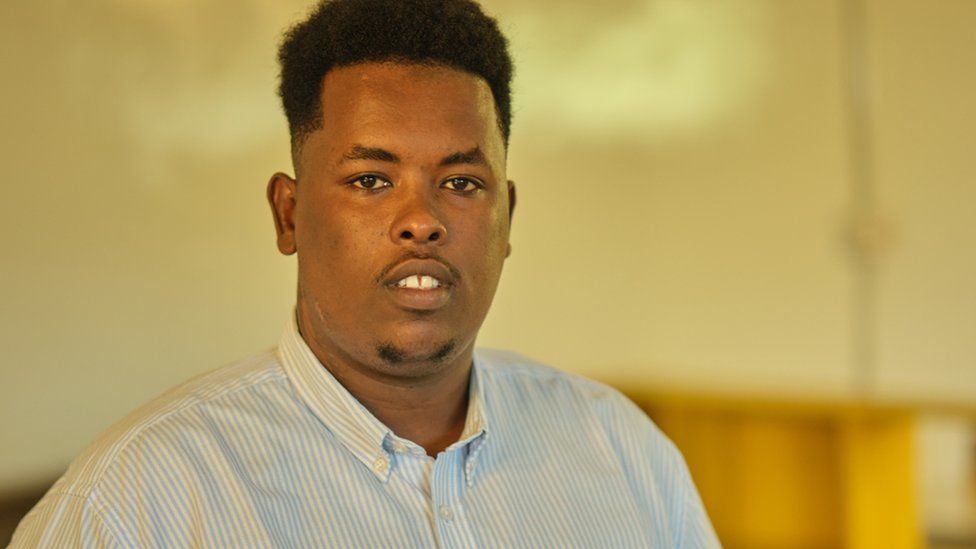Somalia's ban on TikTok, which is set to take effect on Thursday evening, has outraged many users who make a living off the app.
The self-proclaimed "president of Somali TikTokers" is nervous about his financial future.
Bilaal Bulshaawi, one of the prominent faces on Somali social media, says the app has totally transformed his life.
"Before, there were many times when I couldn't afford to pay for a tuk-tuk ride but now I drive a car and enjoy my luxury lifestyle. I travel to different Somali regions for tourism," Bilaal told the BBC.
He started using the platform when he was an 18-year-old high school student making short comedy videos with his classmates. But the popularity of his films snowballed and they have now become his main source of income.
Bilaal makes money by advertising businesses on his account, which has 1.3 million followers. The adverts generate between $500 (£400) and $1000 a week. He uses the money to pay rent, buy food and also to pay his mother's bills.
"My mother was able to stop working," Bilaal added, "she raised me while working as a nurse and when I started my social media I let her rest."
Using a Somali expression he says the government ban will hit them both hard.
"The fire will go out in our kitchens," he says.
But the government seems determined to go ahead with the plan to prevent access to TikTok along with Telegram and gambling app 1XBet.
It argues that these platforms are being used by "terrorists and groups responsible for spreading immorality".
The announced ban comes as the authorities seek to crush the al-Shabab militant group, which still controls large swathes of the country.
Hafsa Hilkas is another creator who is now feeling anxious.
She started using TikTok a year ago and she shares comedy sketches, pranks and entertainment videos on her account. Within three months she had more than half a million followers and then started her own online business on the app selling perfumes.
"I receive so many orders from all the Somali regions," she said.
The 19-year-old's success has enabled her to become financially independent and move out of her family home.
She now fears that she will lose her independence the moment the government's order is implemented.
In a conservative country like Somalia, it is not that easy for a young woman to get a job partly due to sexism. Hafsa told the BBC that even her family was not happy about her moving out and working.
"My family told me to get married. My parents said, 'you are a girl, you don't need to go out and work'", she added, "but I want to work and be an independent woman."

Bilaal and Hafsa both said they had no other option but do similar work on other social media platforms but it will take time to attract followers there and the ban will be painful.
"It is like owning a shop in big market which then burns down. So, it will take time to recover from that damage," said Bilaal.
Over the past few years TikTok has become the most popular social media platform in Somalia and the diaspora.
Many people use it as a source of entertainment - but not everyone thinks the announced ban is a bad idea.
Student Samira Mohamed confesses that she spends many hours on TikTok but she thinks that some of the content disgraces the dignity of Somali girls. This is because the platform has been used to advertise sexually explicit content which is then available to watch via Telegram.
There is also the issue of people blackmailing others by posting embarrassing or compromising videos of them.
"It is all about shaming people. It is damaging people's values and more and more girls are removing their hijabs," she said.
Contrary to Samira's idea, TikTok user Sakariye Mohamed believes that the app gives young people opportunities after the government failed to create a peaceful environment for them to find employment.
"It's a source of income for both educated and non-educated youngsters. It also diverted young people from the pain of unemployment," Sakariye said.
Latest Stories
-
Coastlines in danger even if climate target met, scientists warn
35 minutes -
Tanzania president warns ‘meddling’ Kenyan activists
40 minutes -
Feasibility studies for new national capital underway — Mahama
48 minutes -
National trials loom large as Ghana sprinters chase World Championships qualifying mark
2 hours -
Former Spain, Liverpool goalkeeper Reina announces retirement
2 hours -
Final lineup of teams confirmed for inaugural Betway Tumu Community Cup
2 hours -
Mahama Ayariga condemns “gruesome killing” of Bongo NHIA director
2 hours -
”I’ve seen improvements” – Zito reflects on first month in charge of Kotoko
2 hours -
Black Queens name squad for doubleheader against Cote d’Ivoire
2 hours -
I personally pushed for Board Chair appointment at SEC – Dr. Anane Antwi
2 hours -
Gov’t opens consultations to revise mining policy and Act 703
2 hours -
We will not sell any SSNIT asset – Director General assures
2 hours -
Deputy Finance Minister inaugurates NLA Governing Board
3 hours -
Today’s Front pages :Tuesday, May 20,2025
3 hours -
Bongo NHIA director killed, body burnt in escalating Bawku conflict
3 hours

